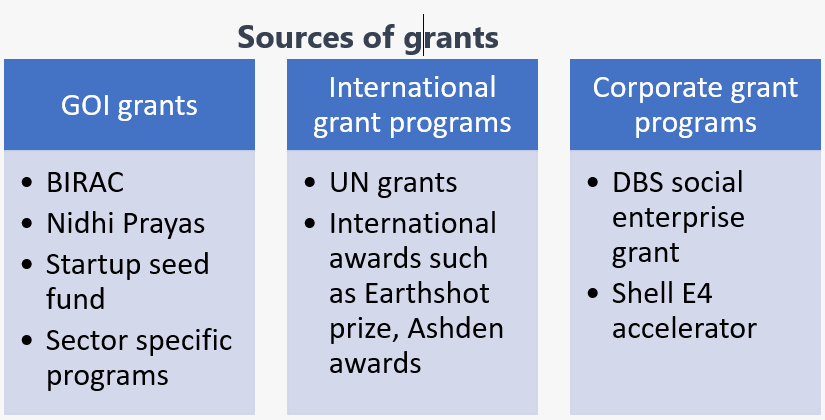
Growing Green: Grants for Indian Climate Startups
Climate startups face a unique challenge: the long development cycle of physical products, spanning 5 to 10 years. For instance, consider Carbon Clean, a pioneering carbon capture startup which has gained recognition (and $150 mn series C funding in 2022) in recent years, its journey began way back in 2009. Another example is Ather Energy, which rolled out its inaugural scooter in 2018, nearly half a decade posts its inception. In this long journey of building and testing the product, the grant is a critical lifeline to provide these startups with the capital required to build and test the prototype or pilot with new customers.
Grants also act as endorsements, signalling a startup’s viability to potential investors and partners. This can significantly ease the process of securing subsequent funding and collaborations. Winning a grant is often a competitive achievement that signifies a startup’s credibility. This validation not only aids in market entry but also strengthens a startup’s position in negotiations with partners and investors. Unlike equity investments, grants do not dilute ownership, thereby allowing startups to access funding without relinquishing control, preserving their vision and mission.
In the blog, we look at the grants that are available to Indian climate tech startups. These can come in the form of cash awards or opportunities to carry out pilots with potential customers or access to events to increase the visibility of the company among investors, policymakers and potential customers. Broadly, in India, grants can come from three sources (pic below), and Government of India (GOI) grants are the most popular. Here is a breakdown of grants:

1. Govt of India (GOI) grants- These are mostly routed through incubator who invite proposals throughout the year. These include
- BIRAC: Focused on biotechnology-driven innovations, offering up to Rs. 50 lakhs for prototype development.
- NIDHI Prayas: Accessible to college students and innovators below 35 years, providing grants up to Rs. 15 lakhs.
- Sector specific programs: Grants for water-related startups under mission AMRUT, grant for R&D projects for green hydrogen under Green Hydrogen mission
- Startup India seed grants: up to Rs. 20 lakhs as grants and up to Rs. 50 lakhs as concessional debt
2. Programmes by United Nations– Various UN organizations like UNIDO, UNDP, UNEP, and UNICEF extend grants across diverse climate sectors such as energy efficiency, ocean health, and air pollution. While UNIDO specifically caters to Indian startups, other competitions are international and may not be regular.
3. Programmes by Incubators– Incubators such as Social Alpha, Villgro, Venture Centre, T-hub and IIT incubation cells offer GOI grants. Additionally, they collaborate with corporations and nonprofits to organize award competitions that come with financial support and mentoring.
4. International challenges awards– These include ASHDEN awards, Earth Shot awards, X foundation awards. Good news is that many Indian startups have been able to win these.
5. Corporate foundations– Corporations establish these foundations independently or in partnership with other foundations or NGOs. Noteworthy examples include DBS Bank’s social enterprise awards, Shell’s E4 accelerator and Ashirvad Pipes’ water challenge in conjunction with the Nudge Foundation.
A list of grant opportunities for climate startups can be downloaded here
As the world gets warmer and we run short on natural resources such as clean air, fertile land and clean water, the flow of grants and other incentives towards climate causes is expected to increase. For example, in 2022, the US govt announced the Inflation Reduction Act (IRA), directing nearly $400 billion[1] in federal funding to clean technologies. Back home in India, GOI has started a number of fiscal incentives for electric manufacturers and grant programs under the Swachh Bharat and Jal Jeevan missions for startups in water management.
While grants are on the rise, their reach remains limited. Only a select few startups have mastered the art of securing grants with some entities consistently standing out. Take Takachar, a company addressing agricultural waste solutions, which has secured numerous grants, including prestigious international accolades like the Earth Shot Prize awarded by the UK’s Prince William. Similarly, Mumbai-based S4S Technology has clinched the Ashden Awards, the CISCO Agri Challenge, and a grant from the Shell Foundation.
Remember, these grants are golden opportunities, but getting them can be a bit tough. So, keep your eyes open for grants that fit what you’re doing, and don’t wait till the last minute to apply!
[1] https://www.mckinsey.com/industries/public-sector/our-insights/the-inflation-reduction-act-heres-whats-in-it

